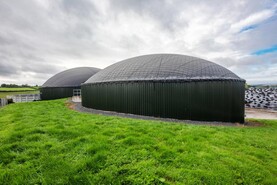Surface waters in Ireland were found to have "low nitrate concentrations", a European Commission document on EU water quality has found.
The report looked at data from 2016 to 2019.
It found that while livestock pressure in Ireland is above the EU average, Ireland's "groundwater quality is generally good" and that there was some encouraging signs in relation to water quality.
"There have been some encouraging signs with water quality improvement in 152 of 726 water bodies that were prioritised areas for action" in the water framework directive (WFD), it said.
The network of monitoring stations in the country has been sufficiently expanded, with a number of monitoring stations having an increasing trend, it found.
Nitrogen
The report found that the surplus of nitrogen in the water is about the EU average, while the surplus of phosphorus is among the highest in the EU.
The Commission has encouraged Ireland to review its action programme in relation to the high nutrient phosphorus surplus and to continue to follow-up hotspot areas that show increasing nitrate concentrations.
Reaction
IFA environment chair Paul O’Brien has said recent comments from the Environmental Protection Agency (EPA) were disappointing as they didn’t accurately reflect the water quality improvements.
“The water quality report from the European Commission shows some encouraging signs for water quality improvement in Ireland.
“In particular, the report shows improvements in 152 of 726 water bodies that were prioritised areas for action in the WFD River Basin Management Plan 2018-21.
“The report also acknowledged that many of the changes that have taken place on farms under the current nitrates action programme, such as fencing of waterbodies, moving of water troughs, diverting run-off from farm roadways away from waterbodies and the compulsory use of low emission slurry spreading (LESS) on all derogation farms, which were only introduced in 2021, were not captured in the water quality reporting period,” said O’Brien.
The report also recognised that these programmes, that work collaboratively with farmers, are very important as they support farmers to select the right measures in the right place, at the right times, the IFA said.
O'Brien said despite all the negative commentary, the report shows that Ireland’s groundwater quality is generally good, with a number of monitoring stations showing an increasing trend.
'Work to be done'
“We all know that there is more work to be done, but it’s important that the work that is ongoing and improvements that are being achieved through programmes such as the Agricultural Catchment Programme (ACP) and the Agricultural Sustainability Support and Advice Programme (ASSAP) are fully recognised,” he added.
He said the report attributed the improvements in water quality to the positive efforts of farmers, local communities, local authorities and other public bodies through the aforementioned programmes.






 This is a subscriber-only article
This is a subscriber-only article










SHARING OPTIONS: